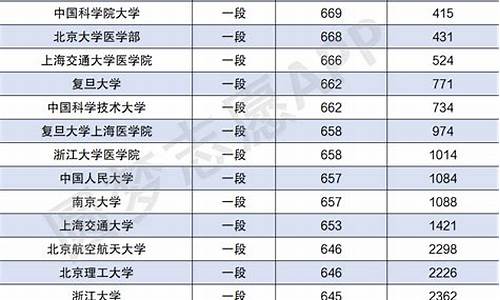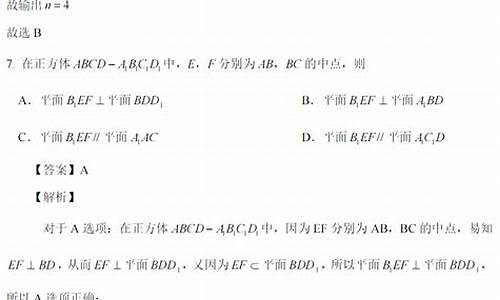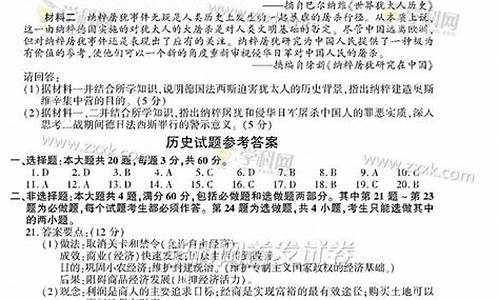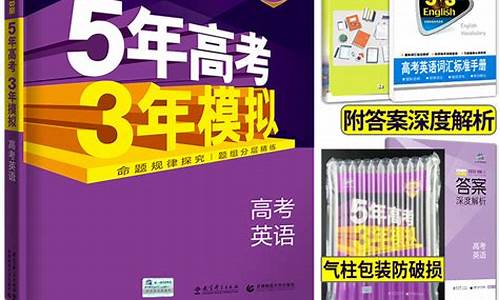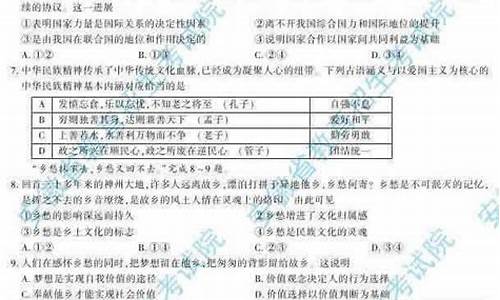高考英语常考语法填空_高考英语常考语法
1.高中英语应该掌握的语法和哪些知识?
2.请问高考英语语法都考什么啊?
3.高中英语语法总结
4.高考英语语法题目类型和分布重点
5.高考英语语法:高中英语语法-插入语六大用法小结
6.高考英语语法填空必背知识
7.人教版高中英语语法知识点
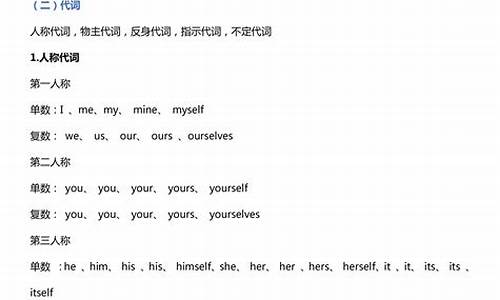
高中英语知识点有哪些?应该怎么学习高中英语?有很多的同学是非常想知道,高中英语语法知识点有哪些,我整理了相关信息,希望会对大家有所帮助!
↓↓↓点击获取更多"高中英语知识点"↓↓↓
★ 高一英语必修一语法知识 ★
★ 高考英语作文万能句子 ★
★? 高三英语复习计划范文 ? ★
★ 英语作文热点话题及范文 ★
高中英语语法重要知识点 :不定冠词
不定冠词a,an与one同源,表示微弱的一的概念,但并不强调数目,用来表示不确定的人或事物。
A用在辅音前,而不是辅音字母前;an用在元音前,而不是元音字母前。
a university in Asia
1.表示同类中的任何一个
A cat has nine lives.
2.表示泛指的某人、某物
I know a John Lennon,but not the famous one.
3.表示数量的
He has a daughter.
4. 表示单位数量的每一
I earn 10 dollars an hour.
5.表示相同的
The two birds are of a color.
6. 用于集体名词前
He grows up in a large family.
7. 在某种情况下可用于抽象名词和物质名词前
China has a long history.
高中英语语法知识点整理 总结 : 定冠词的用法
1.表示特定的人或物
2.表示地球、宇宙中独一无二的事物
主要指各种天体及世界上比较有影响的物体。The sun,the moon,the earth
3.表示地点、方向、时间、方式等 at the corner 在拐角处
1) 在表示季节的名词前常不用冠词。In spring 在春天
2) 具体某年的某个季节,需用冠词。In the summer of the year2008
3)用于序数词或形容词的最高级前 the first the second
4)用于形容词前使其名词化 the rich the poor
5)用于复数姓氏前,表示―夫妇‖或全家 The Smiths
6)用于乐器名词前 Play the piano
7)用于by+the+计量单位名词 By the pound
1. 用于复数名词前
复数名词泛指某类人或物时,其前通常用零冠词。Students should obey the school rules. 学生应该遵守校规。复数名词若需特指,则要加定冠词。The students are too lazy. 这些学生太懒。
2. 用于不可数名词前
不可数名词表示泛指时,其前通常用零冠词。如:Bread is made from flour. 面包是用面粉做的。
Wood is a poor conductor of sound. 木头是声音的不良导体。不可数名词若需特指,则要加定冠词。
He sawed the wood into three pieces. 他把木头锯成三块。
3.用于专有名词前
在通常情况下,专有名词前要用零冠词。如:
Mr Smith is our English teaches us English. 史密斯先生教我们英语。在特殊情况下,若专有名词需要特指,也可加定冠词。如:The Smith you‘re looking for no longer lives here.
4. 用于抽象化的可数名词前
有些可数名词抽象化后表示表示的活动,其前通常零冠词。Jim has gone to bed. 吉姆已上床睡觉了。
She goes to church every Sunday. 她每周星期天都去做礼拜。
这类主要涉及bed, church, class, college, school, university, work, hospital, prison, market, sea, town等。另外,这类名词前用不用冠词有时与英美英语的表达习惯有关。如:―住院‖在英国英语中通常说成 in hospital,而在美国英语中则通常说成in the hospital;类似的还有go to university (英)上大学 / go to the university (美)上大学;at table (英)在吃饭 / at the table (美)在吃饭。
5. 用于职务及头衔前
当表示职务及头衔的名词用作表语、补足语及同位语时,其前通常用零冠词。如:Wilson became President of the U. S. A. 威尔逊当了美国总统。He will be made captain of the football team. 他将被选为 足球 队队长。
6. 在表示学科、语言、三餐、月份、季节、节假日、星期等名词前,通常用零冠词。
We are all interested in physics. 我们大家都对物理感兴趣。
7. 用于某些固定结构中
go to sea 去当水手 at home 在家 at night 在晚上 at least 至少
at most 至多 at first 首先 at last 最后 in bed 在床上
on foot 步行 face to face 面对面
高中英语语法知识点整理总结:代词
高考中对代词的考查主要集中在人称代词(主要是其中的it)、关系代词、指示代词和不定代词上。
一、 it的用法 ?
1.作人称代词
John likes playing Ping pong./ He always does it in the afternoon.(指代上下文提到的事物); /It's time we went home. / How far is it from here to your home ? / It is getting warmer and warmer./ It's very quiet at the moment.(可指时间、天气、环境等) 2.引导词
A.作形式主语,代替由不定式、动名词或从句表示的真正主语。
It's important for us to learn a second language./ It's no use talking to him./ It's known to all that the earth goes round the sun.
B.作形式宾语,代替由不定式、动名词或从句表示的真正宾语。
We feel it our duty to help others./ He made it clear that he would leave the city. C.强调结构:It is (was) +被强调部分+that (或who)…
注意:在强调结构中,如被强调部分为时间状语或地点状语,其后的连接词也绝不能为when 或where,而应用that 。在复习中,一定要注意句式的不同。It was in Shanghai that I bought the guitar.(that引起强调句) It was Shanghai where I bought the guitar.(where引起定从)
It was twelve o'clock when we arrived there.(when引起时间状语从句) It was at twelve o'clock that we arrived there.(that 引起强调句)
3. it,one,that 的区别:作为代词,这三个词的对比使用是高考的 热点 之一。—Why don't we take a little break? —Didn't we just have __________? A.it B.that C.one D.this
The Parkers bought a new house but _________will need a lot of work before they can move in. A.they B.it C.one D.which
one 用以指代同类事物中的任一,that 特指性强,指代可数与不可数词,而it指代上文提过的同一事物。
二、 关系代词
who,whose,whom,which,that,as
1)which可以引导非限定性定语从句,代表前面整个 句子 的内容,并且在从句中做主语 2)that的用法 1)不用that的情况
a) 在引导非限定性定语从句时。b) 介词后不能用。
We depend on the land from which we get our food. We depend on the land that/which we get our food from.
2) 只能用that作为定语从句的关系代词的情况 a) 在there be 句型中,只用that,不用which。
b) 在不定代词,如:anything, nothing, the one, all, much, few, any, little等作先行词时,只用that,不用which。
c) 先行词有the only, the very修饰时,只用that。d) 先行词为序数词、数词、形容词最高级时,只用that。. e) 先行词既有人,又有物时。
举例:
All that is needed is a supply of oil. 所需的只是供油问题。
Finally, the thief handed everything that he had stolen to the police. 那贼最终把偷的全部东西交给了警察。
3) as的用法
AS作关系代词,用来引导定语从句:限制性定语从句和限非制性定语从句 一、AS引导限制性定语从句
AS引导限制性定语从句时,通常和such, the same, as(so)等连用,构成such...as/such as, the same...as/the same as, as(so)...as等结构,在从句中可作主语,宾语和表语。
1.such...as/such as意为―...的那种...,像那样的‖,such...as/such as引导限制性定语从句时,既可指人,也可指物。such用于名词之前时,具有形容词性质;such单独使用(即后面不接名词)时,具有代词性质。
Don‘t trust such men as praise you to your face.(as作主语) 不要相信那种当面吹捧你的人。
You should read only such books as you can understand without much difficulty.(as作宾语) 你应当只读那些你读起来不太难懂的书。
Associate with such as will improve your manners.(as作主语) 要和能改善你的言行的那种人结交。
2.the same...as/the same as意为―与...同样的‖,和such一样,the same既有形容词作用,又有代词性质。
We have arrived at the same conclusion as they have.(as作宾语) 我们已得出和他们同样的结论。
比较:the same...as和the same...that不同,前者是―同那一个相似‖,后者是―正是那一个‖。如:
This is the same watch as I lost. 这同我丢的那块表一样。
This is the same watch that I lost? 这正是我丢的那块表。
3.as(so)...as意为―和...一样‖,后接由many, much等修饰的名词或由形容词修饰的单数名词,注意其语序为as(so)+adj.+a+n+as,如:It‘s as pleasant a film as I have ever seen. 这是一部和我以往看的同样好的**。
As many soldiers as marched were killed. 很多游行的战士都被杀了。
注意:such ...as与such...that ,so...as与 so...that的区别:that是连词,引出结果状语从句,在从句部分不作成分;as是关系代词,引出定语从句,在从句中可作主语,宾语和表语。比较:He is such a nice boy that everyone likes him. He is such a nice boy as everyone likes.
It is so difficult a problem that nobody can work it out. It is so difficult a problem as nobody can workout.
三、AS引导非限制性定语从句
AS引导非限制性定语从句时,通常指的不是主句中的某一个名词(先行词),而是指整个主句表达的内容,对主句所作的陈述进行附加说明,意为―这...,如...或正如...‖。这种从句可位于主句之前,之中或之后。
As we all know, Taiwan belongs to China. Taiwan, as we all know, belongs to China. Taiwan belongs to China, as we all know. 注意下面的习惯用法:
as is well discussed 正如已讨论过的
as is often said 正如通常所说 as is often the case 通常就是这样 as has been pointed 正如所指出的那样 as has been said before 如上所述 as often happens 如同经常所发生的那样 as might be expected正如所料 as is well known to all众所周知
在多数情况下,从句中的谓语助动词可以省略 as explained before 如前面所解释的 as mentioned above 如前面所提到的 as shown in the figure 如图所示 as seen from the table 从表中可以看出 as already discussed 正如已讨论过的
四、不定代词
一) . some 与 any 的用法
1. some 用于肯定句以及表示建议或期待得到肯定回答的问句。修饰单数名词时,意为某个。如:
I have some questions about the assignment. (希望得到肯定答复)。
2. any 用于否定句和疑问句时,表示一些。用于肯定句时,只和单数名词或不可数名词连用,表示任何。如:
The medicine is on sale every where. You can get it at any chemist?s. 二) . each 与 every 的用法
1. each 强调个体,表示两个或两个以上中的每一个,在句中可充当主语、宾语、定语和同位语。如:
There are trees and flowers at each side of the road.
2. every 强调整体,表示三者或三者以上中的每一个,只能作定语,不能说 every of them ,要说 every one of them .
Every student in our class works hard. 三 . no one 与 none 的用法
1. no one 意为没有人,只能指人,不能指物,不可与介词 of 连用,谓语动词用单数形式,回答 who 引导的问句。如:Who is in the classroom? No one.
2. none 既可指人,也可指物,强调数量,意为一点也不,一个也不;谓语动词既可用单数也可用复数;常与 of 连用,通常指三者以上的人或物中没有一个,回答 how much 和 how many 引导的问句。如:
They were all tired, but none of them would stop to have a rest. 四 . other, another, others, any other, the other 的用法
1. other 表示泛指,意为另外的、 其它 的。常与复数名词或不可数名词连用。如果其前有 the, this, some, any, each, every, no, one 以及形容词性物主代词时,其后就可接单数名词。如:I have no other place to go.
2. another 常用于指三者或三者以上中的另外一个,泛指单数。可单独使用,也可后接名词。如果其后接复数名词,则表示又、再、还。如:This cap is too small for me. Show me another (one)。We need another three assistants in our shop.
3. others :它是 other 的复数形式,表示泛指,意为别的人或物,但不指全部。特指时在其前加定冠词;前面可加任何限定词以及数量词。如:He has more concern for others than for himself.
4. any other 表示一个之外的其他任何一个,而不是两个之中的另一个。如:China is larger than any other country in Asia.
5. the other :表示两者中的另外一个。可单独使用,也可接单数名词。如:No agreement was reached in the discussion as neither side would give way to the other.
五 . all 与 both 的用法 均表示都,但 all 表示三者以上的人或物, both 则表示两个人或物。二者都表示肯定意义,如果与 not 连用时,则表示部分否定。
六 . neither 与 either 的用法 都可用于表示两个人或物。neither 表否定意义,意为(两者中的每一个)都不;而 either 表肯定意义,意为(两者中的每一个)都。都可单独使用,也可同介词 of 连用。如:Both teams were in hard training; neither willing to lose the game. Do you want tea or coffee? Either. I really don't mind.
高中英语语法的 学习 方法
首先先你要端正心态,不要急躁,,你做你自己的事,这样才能静下心来学习。要成为英语高手就必须比别人走更多的路,做更多的事。你应该明白一个事实,英语是单词和语法的综合,所以单词和语法都要拿下。
其次,对于单词,有如下几种方法,第一个,是加强记忆的频度,也就是说,早上记了几个,隔几个小时又看一次,总之一天之内,记忆的间隔不要太长,否则你辛苦积累的记忆会随着时间的延长而淡化,第二个,是可以根据自己的理解编 顺口溜 ,比如good morning 是狗摸你…(见笑了)…,第三个,最重要的是,记单词的时候,不要忘了阅读,一边记单词,一边看 文章 ,这样可以把孤立的单词串联起来,记忆的效果会加倍,第四个。
我建议你记单词要分门别类记忆,要形成一个意群,比如,重要性用magnitude magnificence ,表示非常,大大地有exceedingly,tremendously,extremely……这样做在你写作时,是十分有好处的,写作时不要尽写一些低级词汇,你要写高级词汇,比如重要性写magnitude,许多写a multitude of 或者handsome。
高中英语语法知识点整理总结相关文章:
★ 高中英语语法归纳整理
★ 高中英语语法总结
★ 高中英语语法归纳总结
★ 高一英语语法知识点总结
★ 高一英语语法知识点总结(2)
★ 高二英语语法知识点
★ 高三英语的语法知识点归纳
★ 高中英语的语法知识总结
★ 高中英语的知识点归纳
★ 高中必备英语知识点归纳
var _hmt = _hmt || []; (function() { var hm = document.createElement("script"); hm.src = ""; var s = document.getElementsByTagName("script")[0]; s.parentNode.insertBefore(hm, s); })();高中英语应该掌握的语法和哪些知识?
语法复习三:名词性从句
在前面我们已经知道了什么是句子.我们可以这样解释什么叫从句:在一个句子的前面加上一个连接词,这个句子就变成了从句.如果这个从句做了主语,它就是主语从句.其它的以此类推.
注: 1.特殊疑问句本身可以做从句,它不需要加连接词.
2.所有的从句要使用陈述语序. 陈述语序: 句子第一个词永远是主语;第二个词可能是情态动词\助动词等加上动词,或者是动词本身.
名词性从句相当于名词,可分别作主句的主语、表语、宾语和同位语。因此,名词性从句分为主语从句、表语从句、宾语从句和同位从句。
名词性从句,顾名思义,它具有名词性.所以可以作主语,宾语等等.回忆一下句子成分那一章
(一)引导名词性从句的连接词
1、连接代词:who, whose, whom, what, which。有词义,在从句中担任成分,如主语、表语、宾语、或定语等。
2、连接副词:when, where, why, how。有词义,在从句中担任成分,作状语。
3、连接词:that, whether, if, as if, that
(二)主语从句
1、主语从句在复合句作主语。
Who will go is not important.
2、用it作形式主语,主语从句放在句末。
It doesn’t matter so much whether you will come or not.
3、that引导主语从句时放在句首时,不能省略。
That he suddenly fell ill last week made us surprised.
实用例句:
Is it true that he will be punished seriously by the headmaster?
Does it make any difference who bought these gifts?
How strange it is that these children are so quiet!
注意: 表示是否,只能使用whether.
(三)表语从句
1、表语从句在复合句中作表语,位于系动词之后。
The question was who could go there.
2、引导表语从句的连接词that有时可省去。
My idea is (that) we can get more comrades to help in the work.
注意: 表示是否,只能使用whether.
(四)宾语从句
1、宾语从句在复合句中作宾语。引导宾语从句的连词that一般可省略。
I hope (that) everything is all right.
2、介词之后的宾语从句,不可用which或if连接,要分别用what或 whether。
I’m interested in whether you’ve finished the work..
I’m interested in what you’ve said.
3、whether与if都可以引导宾语从句,常可互换。但下面情况不能互换。
if和whether区别
①宾语从句是否定句时,只用if,不用whether。
e.g. I wonder if it doesn’t rain.
②用if 会引起误解,就要用whether。
e.g. Please let me know whether you want to go.(此句如果把whether改成if,
容易当成条件句理解)
③宾语从句中的whether 与or not直接连用,就不能换成if;不直接连用,可换。
e.g. I don’t know whether or not the report is true.
I don’t know whether/ if the report is true or not.
④介词后的宾语从句要用whether引导。whether 可与不定式连用。whether也可引导主语从句、表语从句、同位语从句,还可引导让步状语从句,以上均不能换成if。但引导条件从句时,只能用if,而不能用whether。
It depends on whether we have enough time.
They don’t know whether to go there.
Please come to see me if you have time. 状语从句
实用例句: 使用it作形式宾语
I thought it impossible that he could finish this job in just two hours.
He left it to my judgment whether we should continue this project.
注意: 形式主语和形式宾语只有一个替代词: it
(五)同位语从句
同位语从句在句中作某一名词的同位语,一般位于该名词(如:news, fact, idea, suggestion, promise等)之后,说明该名词的具体内容。
I have no idea when he will be back.
The fact that he had not said anything surprised everybody
一、判断下列各句哪句含有名词性从句,并指出是什么从句:
1. China is no longer what it used to be.
2. The truth that the earth turn around the sun is known to all.
3. It was snowing when he arrived at the station.
4. How he persuaded the manager to change the plan is interesting to us all.
5. The news that they had won the game soon spread over the whole school.
6. The news that you told me yesterday was really disappointing.
7. That is where Lu Xun used to live.
8. He spoke as if he understood what he was talking about.
9. Do you remember the teacher who taught us English at middle school?
10. I wonder why she refused my invitation.
参考答案: 1、表语从句;2、同位语从句;3、不是;4、主语从句;5、同位语从句;6、不是;7、表语从句;8、宾语从句;9、不是;10、宾语从句
二、用适当的连词填空:
1. I can’t decide ____________ dictionary I should buy.
2. That’s ____________ he refused my invitation.
3. I am very interested in ____________ he has improved his pronunciation
in such a short time.
4. ____________ we need is more time.
5. The fact ____________ she had not said anything at the meeting
surprised everybody.
6. ____________ and ____________ they will meet has not been decided yet.
7. Please tell me ____________ you are waiting for.
8. Is that ____________ you are looking for?
9. Would you please tell me ____________ the nearest post office is?
10. I don’t know ____________ he will agree to the plan or not.
参考答案: 1. which; 2. why; 3. how; 4. What; 5. that; 6. when, where; 7. who(m); 8. what; 9. where; 10. whether
三、选择填空:
1. Do you see _____ I mean?
A. that B./ C. how D. what
key: D 宾语从句 that引导宾语从句无词义,也不作成分.mean是及物动词,必须有宾语.所以不选A; how是副词,也不能作mean的宾语.what I mean, what I did, what I said,等是一个非常重要的名词结构.
2. Tell me_____ is on your mind.
A. that B. what C. which D. why
key: B what is on your mind 是what名词结构.句意:告诉我你的心事.
3. We must stick to _____ we have agreed on.
A. what B. that C. / D. how
key: A
4. Let me see _____.
A. that can I repair the radio B. whether I can repair the radio
C. I can repair the radio D. whether can I repair the radio
key: B 从句使用陈述语序 注意选项C可以看成是省略了that的宾语从句,在语法上来讲它是正确的,但语义不通.
5. Keep in mind _____.
A. that the teacher said B. what did the teacher say
C. that did the teacher say D. what the teacher said
key: D what名词结构作keep宾语.
6. Could you advise me _____?
A. which book should I read first B. what book should I read first
C. that book I should read first D. which book I should read first
key: D
7. He was criticized for _____.
A. he had done it B. what he had done
C. what had he done D. that he had done it
key: B
8. Would you kindly tell me _____?
A. how can I get to the Beijing Railway Station
B. how I can get to the Beijing Railway Station
C. where can I get to the Beijing Railway Station
D. whether can I get to the Beijing Railway Station
key: B
9. Mrs. Smith was very much impressed by _____.
A. what had she seen in China B. that she had seen in China
C. what she had seen in China D. which had she seen in China
key: C
10. We took it for granted ___
A. that they were not coming B. that were they not coming
C. they were coming not D. were they not coining
key: A
11. I really don't know _____
A. I should do next B. what should I do next
C. what I should do next D. how I should do next
key: C
12. I'm afraid _____.
A. the little girl will have to be operated on
B. that will the little girl have to operate on
C. the little girl will have to operate on
D. that will the little girl have to be operated on
key: A
13. She walked up to _____ .
A. where did I stand B. where I stood C. I stood there D. where I stood there
key: B where I stood 我站的地方
14. Can you tell me _____?
A. who is that gentleman B. that gentleman is who
C. who that gentleman is D. whom .is that gentleman
key: C 陈述语序
15. We'll give you _____.
A. that do you need B. what do you need
C. whatever you need D. whether do you need
key: C whatever: 1. no matter what 表示让步,副词性 2. anything that ,名词性
如果一个副词性的疑问词加上ever后缀,它只具有副词性.如 whenever=no matter when; however 它是一个很特殊的词: 1.表示转折关系,副词,词义:然而 2.no matter how 无论怎么
16. They want us to know _____ to help us.
A. what can they B. what they can C. how they can D. how can they
key: B what they can (do), what作do的宾语.
17. We must put _____ into practice.
A. what we have learned B. that we have learned
C. that have we learned D. what have we learned
key: A
18. Did she say anything about _____?
A. that the work was to be done B. how was the work to be done
C. that was the work to be done D. how the work was to be done
key: D
19. He was never satisfied with _____.
A. what she had achieved B. had what she achieved
C. she had achieved D. that she achieved
key: A
20. These photographs will show you _____.
A. what does our village look like B. what our village looks like
C. how does our village look like D. how our village looks like
key: B
21. Peter insisted _____ he pay the bill.
A. on that B. what C. that D. on which
key: C insist 后面加that从句要用虚拟的形式: should+v, should可省略
22. They urged _____ the library open during the vacation.
A. when B. where C. why D. that
key: D 同上
23. We wish we could have learned _____ when we were at high school.
A. what you did B. that you had done
C. that what you did D. what did you do
key: A
24.1 will describe to you _____ I saw when there.
A. what B. that C. which D./
key: A
25. From _____ I should say he is a good worker.
A. what 1 know of him B. that I do know of him
C. what do I know of him D. that do I know of him
key: A
26. I will give this dictionary to __ wants to have it.
A. whomever B. anyone C. whoever D. someone
key: C any one who wants to have it
27._____ they will come here hasn't been decided yet.
A. What B. That C . When D. Where
key: C
28. _____ was said here must be kept secret.
A. Who B. The thing C. Whatever D. Where
key: C
29. It is still a question _____ we shall have our sports meet.
A. if B. that C. what D. when
key: D
30. I'm going anyway. _____ she will go is up to her to decide.
A. If or not B. Whether or not C. If D. That
key: B
31. It is strange _____ she have left without saying a word.
A. that B. what C. why D. how
key: A
32. It is very clear _____ our policy is a correct one.
A. what B. that C. why D. where
key: B
33. _____ Mr Zhang said is quite right.
A. That B. When C. What D. Whether
key: C
34. It has been decided _____ he will be sent there.
A. if B. whether C. why D. that
key: D
比较: It hasn't been decided whether he will be sent there.
35. It doesn't matter _____he' s come back or not.
A. if B. whether C. that D. when
key: B
36. It's a great pity _____ we won’t be able to finish the task on time.
A. when B. that C. why D. where
key: B
37. It happened _____ I wasn't there that day.
A. when B. why C. where D. that
key: D it happened that... 碰巧...
38._____ you have done might do harm to other people.
A. What B. That C. Which D. The things
key: A
39. _____ leaves the room last ought to turn oft the lights.
A. Anyone B. The person C. Whoever D. Who
key: C anyone who
比较: who left the room last is being looked into.
40._____ the 2000 Olympic Games won't be held in Beijing is known to all.
A. Whether B. If C. Whenever D. That
key: D
41. _____ fails to see this will make a big mistake.
A. That B. Whoever C. Whether D. Whether or not
key: B anyone who
42. __ we need more equipment is quite obvious.
A. What B. Whether C. That D. Whatever
key: C
43. Has it been announced _____?
A. when are the planes to take off B. that are the planes to take off
C. where are the planes to take off D. when the planes are to take off
key: D
44. That is _____ we all support his idea.
A. what B. why C. where D. when
key: B
45. That’s _____ we should do.
A. that B. what C. how D. why
key: B
46. _____ is troubling me is _____ I don’t understand _____ he said
A. What; that; what B. What; what; what
C. That; that; what D. Why; that; which
key: A
47. Things were not _____ they seemed to be.
A. when B. why C. that D. what
key: D
48. That’s _____ I want to say.
A. all what B. what C. all which D. what that
key: B
49. That’s _____ .
A. where our differences lie B. our differences lie there
C. where do our differences lie D. that where our differences lie
key: A
50. That is _____ .
A. where lived he there B. where did he live
C. where he lived D. that where he lived
key: C
51. The questions is _____.
A. whether is it worth doing B. that if it is worth doing
C. whether it is worth doing D. if it is worth doing
key: C
52. Water will continue to be _____ it is today next in importance to oxygen.
A. how B. which C. what D. as
key: C
53. That's_____.
A. how did I become a teacher B. how I became a teacher
C. how a teacher I became D. that I became a teacher
key: B
54. They are just _____.
A. that what shall I have B. what shall I have
C. that I shall have what D. what I shall have
key: D
55. It looked ____.
A. as if it was going to rain B. that as if it was going to rain
C. as if was it going to rain D. as if that it was going to rain
key: A
56. That's_____.
A. how she did it B. that how did she do it.
C. how did she do it D. what she did it
key: A 注意选项D,多了一个词: it
57. That is _____ we decided to put the discussion off.
A. where B. which C. that D. why
key: D
58. That’s _____ I lived when I was ten years old.
A. where B. at which C. there where D. when
key: A
59. My suggestion is _____ we should send a few comrades to help them.
A. if B. that C. when that D. that where
key: B
60. The idea _____ all people are selfish is wrong.
A. what B. that C. why D. if
key: B
61. We heard the news _____ our team had won.
A. that B. what C. whether D. why
key: A
62. The fact _____ he hadn’t said anything surprised us all.
A. why B. if C. that D. whether
key: C
63.I have no idea _____ she will be back.
A. that B. where C. that when D. when
key: D
64. We must keep in mind the fact _____ China is still a developing country.
A. whether B. that C. why D. when
key: B
65. They have no idea at all _____.
A. where he has gone B. where did he go
C. where has he gone D. which place he has gone
key: A
请问高考英语语法都考什么啊?
高中英语有十五个语法点一:名词和冠词,考点有名词的可数与不可数,名词的格,名词作定语,冠词的考点是,定冠词与不定冠词,零冠词。二:代词和it的用法,一般常考的是other,another,the other,others的区别,both,either,neither,all,every,each,none的区别,还有something,anything,everything的用法(这个比较简单)这一块最难的应该是it,that,one作代词时的区别了三:介词和连词,一般考动词的固定搭配,in,at,for,to,of,on,with,about,from,into,after···常用介词。连词最常考得应该是“除此之外”了,expect,expect for,besides,还有表原因的连词;as,for,since,because的区别四:形容词和副词,这一块比较简单最常考的就是比较级了,其次是以ly结尾但不是副词的词了,比如说friendly是形容词,形容词的排序问题在今年的高考中也出现了,不过这个是基础但不是重点五:动词和动词短语,这个考点是重点,在完形填空及改错和单选中是必考的,这个只能靠你自己的积累,课本中的动词短语是重点,必须记下来六:情态动词和虚拟语气,常见的情态动词就够应付考试了,虚拟语气是高中语法的难点但不是重点七:动词的时态和语态(就是主动句和被动句)时态有一般现在时,一般过去时,现在进行时,过去进行时,一般将来时,现在进行表将来,一般现在表将来,过去将来时(一般不考),现在完成时,过去完成时,现在完成进行时(现在很常考)。八:非谓语动词,动名词作主语,不定式作主语,动名词作宾语,不定式作宾语,动名词作定语,不定式做定语,这一块也比较简单九:数词和主谓一致,数词的考点;基数词,序数词,分数,百分数,(这一块既不是难点也不是重点),主谓一致在以前比较重要,现在地位有所下降十:简单句和并列句,这一块很简单十一:定语从句,这可是重点,不过只要上课认真听,这一块其实不难理解十二:名词性从句,常和定语从句进行比较区别,尤其是what和that的区别十三:状语从句,时间地点状语从句,原因状语从句,结果状语从句,方式状语从句,目的状语从句,有一个问题可以总结以上三个从句十四:省略,倒装和强调。比较常考的是,部分倒装和全部不倒装,这一块就这一个重点十五:交际英语,也就是口语,这一部分现在很火,每年必考,这个只有靠自己总结。以上就是十五道选择题的来源,当然,不是哪个都会考得,你只要学会以上十五个考点,在高考时绝对没问题谢谢采纳!
高中英语语法
组成句子的各个部分叫句子成分。英语句子成分有主语,谓语,表语,宾语,宾语补足语,定语,状语等。
顺序一般是主语,谓语,宾语,宾语补足语,而表语,定语,状语的位置要根据情况而定。
1、主语
主语表示句子主要说明的人或事物,一般由名词,代词,数词,不定式等充当。
Helikeswatch'ingTV.他喜欢看电视。
2、谓语
谓语说明主语的动作,状态或特征。
1),简单谓语
由动词(或短语动词)构成。
可以有不同的时态,语态和语气。
Westud'yforthepeo'ple.我们为人民学习。
2),复合谓语:情态动词+不定式
Icanspeakalit'tleEng'lish.我可以说一点英语。
3、表语
表语是谓语的一部分,它位于系动词如be之后,说明主语身份,特征,属性或状态。一般由名词,代词,形容词,副词,不定式,介词短语等充当。
Mysis'terisanurse.我姐姐是护士。
4、宾语
宾语表示动作行为的对象,跟在及物动词之后,能作宾语的有名词,代词,数词,动词不定式等。
WelikeEng'lish.我们喜欢英语。
有些及物动词可以带两个宾语,往往一个指人,一个指物,指人的叫间接宾语,指物的叫直接宾语。
Hegavemesom'eink.他给了我一点墨水。
有些及物动词的宾语后面还需要有一个补足语,意思才完整,宾语和它的补足语构成复合宾语。如:
Wemakehimourmon'itor.我们选他当班长。
5、定语
在句中修饰名词或代词的成分叫定语。
用作定语的主要是形容词,代词,数词,名词,副词,动词不定式,介词短语等。形容词,代词,数词,名词等作定语时,通常放在被修饰的词前面。
Heisanewstu'dent.他是个新生。
但副词,动词不定式,介词短语等作定语时,则放在被修饰的词之后。
Thebikeintheroomismine.房间里的自行车是我的。
6、状语
修饰动词,形容词,副词以及全句的句子成分,叫做状语。用作状语的通常是副词,介词短语,不定式和从句等。状语一般放在被修饰的词之后或放在句尾。副词作状语时可放在被修饰的词前或句首。
HelivesinLon'don.他住在伦敦。
7.补语用来说明宾语或主语所处的状态或正在进行的动作,因为英语中有些动词加宾语后意思仍然不完整,如:make(使...),ask(请)等等。如果我们说:我们使我们的祖国。这不是一句完整的话。应该说:我们使我们的祖国更美丽。这是的“美丽的(beautiful)”为形容词做补语,说明祖国的状态。英语句子为:We will make our country more beautiful.作补语的词或词组为:形容词,副词,名词,不定式,ing形式,数词等。
句子的类型:
1.主语+谓语
2.主语+谓语+状语
3.主语+谓语+宾语
4.主语+系动词+表语
5.主语+谓语+间接宾语+直接宾语
6.主语+谓语+直接宾语+间接宾语
7.主语+谓语+宾语+宾语补足语
高中英语语法总结
比较常考“虚拟语气”、“非谓语动词”、“主从复句”“主谓一致”“时态语态”“动词搭配”“词法句法”等等。总之,自己最好买一本语法书看看,OK?我向你推荐一本《英语语法实践指南》,挺不错的,你可以买来做一下。
高考英语语法题目类型和分布重点
高中英语语法总结
定语从句 :限制性定语从句和非限制性定语从句
名词性从句:主语从句、表语从句、宾语从句、同位语从句
时态:现在完成时 过去完成时 将来完成时 现在完成进行时 过去完成进行时 将来完成进行时
状语从句
非谓语动词的用法
虚拟语气的运用
推荐你个好东东,魏训刚的《高考语法完全突破》视讯教程,非常好用。有配套练习和记忆大纲,三件一套,又叫中学语法三剑客,现在很热,可以搜来看看。
定语从句 ,状语从句,表语从句, 名词性从句(主语从句 宾语从句 同位语从句) 倒装 省略 反意疑问句 动词短语 冠词
满意请采纳,谢谢
分词(participle)
现在分词一般式 否定式 完成式 被动式
Doing Not doing Having done Being done
Not having done Having been done
Not being done
现在分词,过去分词
现在分词表示被动,表进行;及物动词的过去分词表被动,完成。
Boiling water 正在沸腾的水 boiled water 已经开过的水
The rising sun 正在升起的太阳 the risen sun 升起了的太阳
A developing country 发展中国家 a developed country 发达国家
*现在分词和过去分词都可以在句中作表语,定语,状语和宾语补足语。
作表语
。现在分词作表语一般表示主语的特征和句中主语是主谓关系,主语一般是物,有时也可以是人。
。过去分词做表语一般表示主语所处的状态和句中主语是逻辑的动宾关系,主语一般是人,也可以是物。
(1) the film is moving we are moved
disappoint /surprise /move /frighten /inspire /interest
The boy is disappointing and his father is disappointed.
He tried be calm, but his voice sounded a bit surprised.
be covered /lined with
The door remained locked They remained listening.
2.做定语:
有些词的过去分词有两种 learned /learned burned /burnt lighted/light
一般规则变化的做定语,不规则变化的不做定语
*单独的一个分词做定语通常放在被修饰词的前边,分词短语做定语放在被修饰词的后边,相当于一个定语从句。
1( 使动词的用法
*a girl named Mary came to see me .
*a girl calling herself Mary came to see me .
a moved girl = a girl who was moved a moving film =a film which is moving
a surprised look /expression on his face
2) I read the book written (which was written) by lu xun
Tell the children playing the guitar not to make so much noise.
The building being built is our teaching building.
He lives in a room facing the south.
注:有些词只能用定语从句表达而不能用过去分词的形式。
The boy who came to see me is my brother.
There were aidents that always happened.
3) 现在分词短语和过去分词短语都可以做非限制性定语,相当于一个非限制性定语从句 . The book, written in 1980, tells of struggle.
2.作状语: 时间状语,原因状语,条件状语,伴随状语。
He went into the lab, following other students.
The teacher went into the lab, followed by a group of students.
Being a young people, he is always ready to help others.= as he is a young people ,…..
Given more time, he would do it even better. =if we were more time ,………..
Being ill, he didn’t go to school. = as he is ill ,he didn’t ……..
Not knowing what to do, went to ask marl.
Not having received her lessons well, she failed in the exam.
Having finished her work, she went home.
Getting up early, you’ll catch the bus. =if you get earlier ,……..
considering 就…而言 考虑到,各方面考虑起来
She seems very bright, considering.
Considering the distance, he arrived quickly.
The hall is still in good condition, considering that it was built almost 1000 years ago.
注:1) Generally speaking, he is a good person.
Judging from his skin, he is an African.
He left home, determined not to set his foot in his home.
但是 to tell the truth ,……. To be honest ………
regarding = about 关于…的问题
He spoke to me regarding his failure .
I must speak to you regarding this matter.
2) 分词做状语,分词的逻辑主语必须与主句的主语一致。
While visiting a city, a guidebook is very useful.
While reading the letter, tears e to her eyes. (错误)
当分词做状语,分词的逻辑主语与主句的主语不一致时, 分词可以在自己的前 面加上自己的逻辑主语,这样后构成的短语叫独立主格结构,一般用逗号与主句分开。
It being Sunday .I don’t have to go to work.
He being a party member, his deeds are expected by all.
Our work having been finished, we went home.
They’re being no buses, we went home.
Weather permitting; we’ll start on Saturday.
Mr. *** ith is shy and doesn’t speak until spoken to.
4. 做宾语补足语。
see , watch , hear , notice , feel , find , get , have , leave , keep +n./+分词
I’m sorry to have kept you waiting for such a long time.
When he woke up , he found himself lying on the ground .
Don’t have the medicine working all the time.
I won’t have you talking to your mother like this .否定表示不允许,不容忍。
* get *** . /sth . doing 使。。重新开始
get the clock going get the car going 跑/ start 启动
It’s not hard to get the children speaking, but it’s hard to s them.
I often hear the song sung in English.
he spoke loudly in order to make himself heard clearly .
I saw the boy beaten by tom.
The teacher found jack seated / sitting in the room.
The boy was last seen playing in the river.
注: dress ---- be dressed seat ------be seated fix ---one’s eye be fixed on
We found her dressed in red today.
The thief was caught stealing
Dressed in red, she went out.
We found him hidden behind the door.
We sat there silent, her eyes fixed on that army camp.
I didn’t hear a single word in his talk referring to your absence from the meeting.
Do you know the man referred to at the meeting?
He walked along the river, his hands folded across his shoulder.
Feel one’s heart beating fast. /his face exposed.
Compared with tom, he is an honest man.
Comparing what he had with tom, he is satisfied.
The Gerund 动名词
—。 构成。
语态/形式 一般式 完成式 复合结构
主动 Doing Having done One’s doing
被动 Being done Having been done
否定形式一律在其前加not
II .用途: 定语,宾语,主语,表语
做主语:动名词做主语,谓语动词用单数。
Smoking does harm to your health.
Tom’s ing made us happy.
Her not ing back made her father angry.
His being punished by the teacher is known to us.
Looking after children is her job.
Seeing is believing (前后对应)眼见为实。
Teaching is learning 教学相长。
My falling ill worried him greatly.
注意下列结构: It is no use / good / useful doing
It is no good quarrelling with them.
It is no use regretting what you have done.
2. 定语
动名词做定语表示用途。(即 ving 做定语有两个意思 1)表动作在进行 2)表用途)
a walking stick / a changing room 更衣室/ a hiding place / an operating table
a collecting tin / a weight machine / building material / drinking water / swimming pool
a washing machine / a sleeping car / a *** oking room / sowing machine 播种机
booking office 售票处 / training class 训练班 /translating machine 翻译机
3.作表语,可以与主语互相转换。
His worst habit is eating too fast.
Our job is playing all kinds of instruments.
Their job is making model planes.
The real problem is getting all the materials ready before the end of the month.
The problem is his son’s having taken the other’s money.
4. 做宾语。
动名词既可以做动词宾语,也可以作介词宾语。
He has finished reading the book.
We could hear the noise of the desk’s being opened. and closed.
He came to attend the concert without being invited.
He suggested the text’s being translated into Chinese.
You should practise listening to English.
She looked forward to receiving her mother’s letter.
注意:1)有些动词或动词短语后面, 必须用动名词做宾语,而不用不定式。
enjoy , finish , mind , risk , avoid , forbid , excuse , practise , imagine , suggest , delay , miss , escape , can’t help , consider ,
be worth doing / be busy doing / give up doing / put off doing / insist on doing
keep / prevent /s from doing feel like doing / prefer doing to doing
be afraid of / be tired of / be fond of / be proud of /sueed in
. the wounded solider escaped being killed in the fighting .
do you mind my *** oking here ?
Don’t be afraid of asking for help.
The boy insisted on being severed with cake.
2)要特别注意以下几个片语
pay attention to / look forward to / devote oneself to / make contribution to
stick to / be /get used to / object to / refer to / get down to / see to ( 处理)
He objected to being treated as a child.
The scientist devoted himself to inventing this new machine.
有些动词跟to do 和doing 均可,但意思不同。
fet to do 忘记做/去做一件事 (没有做)
fet doing 忘记过去做过某事 。
I fet to close the window when I left my office.
Don’t fet to post the letter for me.
I fet meeting you in the street the other day.
remember to do 记住去做某事
remember doing 记得做过某事
please remember to close the window when you leave .
I remember having given the book to you.
regret to do 对现在要发生的事情表示遗憾,抱歉。
Regret doing 对已经发生的事情表示后悔。
I regret to say / to tell you that I can’t go with you.
He regretted having told you about it.
mean to do 打算,想要做,有做某事的意图。
Mean doing 意味着
I mean to go with you.
He didn’t mean to hurt you.
It means finishing in time.
Giving him such books to read means waste his time .
e. try to do 试图于,设法干,尽力于
try doing 试着干
The boy tried to open the door.
He tried driving a bus.
s to do /doing
go on to do / doing
be sure to do 肯定会 ,讲会者肯定
be sure of doing 主语自己会
He is sure to e
I am sure of his ing.
H. like /hate to do
Like hate doing
Nobody likes being laughed at.
4. 注意: need, want require +doing = need, want, require to be done
The room wants cleaning / to be cleaned
The child needs looking after / to be looked after
5. 有些 介词加doing 表示时间
on /upon doing = as soon as
in doing = when /while
On hearing the news, he jumped with joy.
In working in shanghai, he made a lot of friends.
=While working in shanghai, he made a lot of friends.
定语从句 ,状语从句,表语从句, 名词性从句(主语从句 宾语从句 同位语从句) 倒装 省略 反意疑问句 动词短语 冠词
语专家葛传槼先生曾说:“语法是语言的法则。”英语语法是英国语言的实际用法,是通过语法家的调查研究、分析、综合而总结出来的,不是凭空臆造出来的。任何人使用英语,不管他是否学过语法,都必须依照语法。举个极简单的例子说,任何人写或讲“My mother studies English.”这一句,决不可把My改作I或Me,也不可把studies改作study或studys,也不可在English前面加上the。至于他是否知道possessive(所有格),indicative(直陈语言),third person(第三人称),article(冠词)等名称,那是另一问题。<br> 我国的英语学习者大多是十多岁的青少年,或者理解力较强,或者模仿力较强,在没有英语环境的情况下,学习语法,了解所学语言的规则,可以缩短学习过程,掌握英语的规律,尽快提高听、说、读、写、译的能力。<br> 那么,怎样学习语法呢?下面拟从四个方面简要谈一谈:<br> (1)练好基本句型<br> 我国近年来的英语教学实践证明:在初学阶段,采用听说领先、学习基本句型的方法去学习英语语法,是行之有效的。<br> 句型学习是通过听说领先的方法去学习传统语法里最常用的语法专案(把它们变为句型去操练)。句型训练实际上吸取了传统语法与结构语法两派的长处。目前国内的英语广播(电视)教学,在入门阶段,多采用句型教学法。因此学生们或者收听广播(收看电视)进行学习,或者根据所选用的课本提供的句型用替换词进行替换练习。所学的句型应该是由浅入深,由简到繁;讲求熟练掌握,不要贪多冒进。每学一个专案,首先要把单项练习练熟,然后过渡到综合练习,最后则应做到扩大运用。<br> 以定语从句这一项为例,首先要反复进行替换练习。把“I read a novel yesterday.”和“It was extremely Interesting.”这两个单句改为“The novel I read yesterday was extremely interesting.”这就是定语从句的单项练习。再如把“I saw a man this morning.”和“The man is my teacher.”改为“The man I saw this morning is my teacher.”;把“I saw a film last night.”和“The film was very amusing.”改为“The film I saw last night was very amusing.”这种练习虽然是枯燥的,却是重要的基本功,把定语从句练到脱口而出的地步。这是第一步。<br> 第二步是把定语从句放在一定的语言情景中去综合运用,进行一问一答。如:<br> A:Did you enjoy the opera?<br> B:Which opera?<br> A:The one we saw last night,of course.<br> B:Yes,very much.<br> 第三步是扩大运用,也就是把定语从句和以前学过的两三个专案放在一起去操练。<br> A:Do you know who Edgar Snow was?(一般疑问句;宾语从句)<br> B:Yes,he was an American writer who interviewed Chairman Mao in Beijing.(定语从句)<br> A:Oh,now I remember.He was the author who wrote“Red Star Over China”,wasn't he?(定语从句;反意疑问句)<br> B:Exactly.<br> 这种回答不但练了定语从句,而且复习了一般疑问句和反意疑问句,也给名词从句的学习打了“埋伏”。进行句型操练,既需要“滚雪球”(复习已学的专案),也需要“打埋伏”(预先练一下将来要学习的专案)。<br> 在句型学习阶段必须注意:在听、说领先的前提下,写、读要跟上,力求听、说、写、读四会均衡发展。因此,时间上要做出合理的安排。早上通常可安排为朗读时间。如果能每日坚持下去,收效一定很大。<br> (2)结合课文去学<br> 吕叔湘先生说过:“与其多读语法书,不如多读文章。”又说:“词语要嵌在上下文里才有生命,才容易记住,才知道用法。”(引自《中国人学英语》)课文是学习英语的“重要基地”。课文里有语音、词汇专案,也有各类语法专案。它们有机地结合在课文里。课文中出现的语法专案,是有血有肉的,不是干巴巴的。通过课文去学语法,可以学得活,记得牢,这比孤零零地背诵语法条目要有效得多。因此,在句型学习结束后,宜结合课文去学语法,要围绕课文中出现的主要语法专案,循序渐进地学习比较系统的语法知识。
语专家葛传槼先生曾说:“语法是语言的法则。”英语语法是英国语言的实际用法,是通过语法家的调查研究、分析、综合而总结出来的,不是凭空臆造出来的。任何人使用英语,不管他是否学过语法,都必须依照语法。举个极简单的例子说,任何人写或讲“My mother studies English.”这一句,决不可把My改作I或Me,也不可把studies改作study或studys,也不可在English前面加上the。至于他是否知道possessive(所有格),indicative(直陈语言),third person(第三人称),article(冠词)等名称,那是另一问题。
我国的英语学习者大多是十多岁的青少年,或者理解力较强,或者模仿力较强,在没有英语环境的情况下,学习语法,了解所学语言的规则,可以缩短学习过程,掌握英语的规律,尽快提高听、说、读、写、译的能力。
那么,怎样学习语法呢?下面拟从四个方面简要谈一谈:
(1)练好基本句型
我国近年来的英语教学实践证明:在初学阶段,采用听说领先、学习基本句型的方法去学习英语语法,是行之有效的。
句型学习是通过听说领先的方法去学习传统语法里最常用的语法专案(把它们变为句型去操练)。句型训练实际上吸取了传统语法与结构语法两派的长处。目前国内的英语广播(电视)教学,在入门阶段,多采用句型教学法。因此学生们或者收听广播(收看电视)进行学习,或者根据所选用的课本提供的句型用替换词进行替换练习。所学的句型应该是由浅入深,由简到繁;讲求熟练掌握,不要贪多冒进。每学一个专案,首先要把单项练习练熟,然后过渡到综合练习,最后则应做到扩大运用。
以定语从句这一项为例,首先要反复进行替换练习。把“I read a novel yesterday.”和“It was extremely Interesting.”这两个单句改为“The novel I read yesterday was extremely interesting.”这就是定语从句的单项练习。再如把“I saw a man this morning.”和“The man is my teacher.”改为“The man I saw this morning is my teacher.”;把“I saw a film last night.”和“The film was very amusing.”改为“The film I saw last night was very amusing.”这种练习虽然是枯燥的,却是重要的基本功,把定语从句练到脱口而出的地步。这是第一步。
第二步是把定语从句放在一定的语言情景中去综合运用,进行一问一答。如:
A:Did you enjoy the opera?
B:Which opera?
A:The one we saw last night,of course.
B:Yes,very much.
第三步是扩大运用,也就是把定语从句和以前学过的两三个专案放在一起去操练。
A:Do you know who Edgar Snow was?(一般疑问句;宾语从句)
B:Yes,he was an American writer who interviewed Chairman Mao in Beijing.(定语从句)
A:Oh,now I remember.He was the author who wrote“Red Star Over China”,wasn't he?(定语从句;反意疑问句)
B:Exactly.
这种回答不但练了定语从句,而且复习了一般疑问句和反意疑问句,也给名词从句的学习打了“埋伏”。进行句型操练,既需要“滚雪球”(复习已学的专案),也需要“打埋伏”(预先练一下将来要学习的专案)。
在句型学习阶段必须注意:在听、说领先的前提下,写、读要跟上,力求听、说、写、读四会均衡发展。因此,时间上要做出合理的安排。早上通常可安排为朗读时间。如果能每日坚持下去,收效一定很大。
(2)结合课文去学
吕叔湘先生说过:“与其多读语法书,不如多读文章。”又说:“词语要嵌在上下文里才有生命,才容易记住,才知道用法。”(引自《中国人学英语》)课文是学习英语的“重要基地”。课文里有语音、词汇专案,也有各类语法专案。它们有机地结合在课文里。课文中出现的语法专案,是有血有肉的,不是干巴巴的。通过课文去学语法,可以学得活,记得牢,这比孤零零地背诵语法条目要有效得多。因此,在句型学习结束后,宜结合课文去学语法,要围绕课文中出现的主要语法专案,循序渐进地学习比较系统的语法知识。
分词(participle)现在分词一般式 否定式 完成式 被动式 Doing Not doing 百度一下奥风英语的中学语法三剑客就行了
求高中英语语法总结内容太多,给你网址,自己去看,望能采纳~~~~
:baike.baidu./view/328219.htm
高中英语语法总结 ····全去网上搜《高考语法完全突破》视讯教程或是与之配套的记忆大纲吧,直接针对高考,非常全的。
高考英语语法:高中英语语法-插入语六大用法小结
虚拟语气
1.虚拟语气的标准句式
2.标准句式与综错句式
3.条件句的省略倒装
4.虚拟语气的含蓄条件句
介词with, without, under, in, but for 等表示含蓄条件;
连词but, or, or else等表示含蓄条件;
副词otherwise, unfortunately等表示转折假设:
5.省略主句的虚拟语气结构if only
6.用于宾语从句的虚拟语气
that宾语从句需用(should)十动词原形表示虚拟的动词:
advise, recommend, propose, suggest, insist, move, urge, command, direct, order, ask, demand, request, require, maintain, prefer, desire, vote that不可以省略;should可以省略:
以上动词的同词根名词在that同位语从句和表语从句的谓语需用(should)十动词原形
如:
insistence, preference, recommendation, suggestion, proposal, motion, desire, requirement, request, order, necessity
以上动词的同词根形容词及分词在that主语从句的谓语需用(should)十动词原形,如:
advisable, desirable, insistent, preferable, urgent; advised, arranged, commanded, demanded desired, ordered, proposed, recommended, requested, required, suggested; essential, important, natural, necessary, possible, proper, strange
7.用于目的状语从句的虚拟语气 in case; in fear that; lest
8.用于方式状语从句的虚拟语气
9.常用的虚拟语气句式
1) it is high time
2) would rather
3)情态动词完成式可以表示责备、推测语气;
倒 装
全部倒装与部分倒装:
1.否定词语置于句首
never, no, neither, hardly, scarcely, little, seldom, rarely, not until, nowhere, at no time, on no account, in no respects, in no sense, in no way, under no circumstances, by no means, no longer, no less, no more, no sooner, in vain
2. only十状语置于句首
only加副词:only then,only once
only加介词短语:only at that time,only in this way,only by doing
only加状语从句:only because, only when
3.not only……but also……置于句首
4.so……that……状语、表语置于句首
5.than引导的比较状语从句(可以)
6.表语+系动词+主语
7.存在句
8.as引导的方式状语从句(可以)
主谓一致
常出现在主谓部分倒装结构中;常出现在主语与谓语之间有定语从句或其他修饰结构的句子中;常出现关系代词作主语的定语从句中;
1.以-s结尾的名词的主谓一致
1学科名词2构词单复3专有名词
................................................
高考英语语法填空必背知识
《高中英语语法-插入语六大用法小结》由英语我整理,更多请访问:。本内容整理时间为05月12日,如有任何问题请联系我们。
插入语六大用法小结
在英语学习中,插入语是一个比较重要的知识点。由于插入语是一种独立成分,通常与句中其他成分没有语法上的关系,许多同学在学习过程中会有一定的困难。其实,插入语大都是对一句话进行附加说明或解释,通常由一个词、一个短语或一个句子构成,常置于句首、句中或句末,一般用逗号或破折号与句子隔开。下面举例归纳插入语的几种用法。
例1 _____the more expensive the camera, the better its quality.
A.General speaking B.Speaking general
C.Generally speaking D.Speaking generally
解析:本题答案为C.generally speaking为分词短语,意思是?一般来说?,在句中用作插入语。
小结:许多分词短语可以用作插入语,这样的分词短语有:strictly speaking(严格地说),generally considering(一般认为), judging from?(根据?判断)等。
例2 Two middle-aged passengers fell into the sea. ____,neither of them could swim.
A.In fact B.Luckily
C.Unfortunately D.Naturally
解析:本题答案为C.unfortunately为副词,意思是?令人遗憾地,不巧,可惜?,在句中用作插入语。
小结:常用作插入语的副词或副词短语有:indeed(的确),surely(无疑),however(然而),frankly(坦率地说),obviously(显然),naturally(天然地),luckily (happily) for sb.(算某人幸运),fortunately(幸好),strangely(奇怪),briefly(简单地说)等。
例3 Your performance in the driving test didn?t reach the required standard,_____, you failed.
A.in the end B.after all
C.in other words D.at the same time
解析:本题答案为C.in other words为介词短语,意思是?换句话说?,在句中用作插入语。
小结:常用作插入语的介词短语有:in conclusion(总之),in a word(简而言之),in short(简而言之),in general(一般说来),in a sense(在某种意义上),in my view(在我看来),in his opinion(按照他的看法),in fact(事实上),at first(首先), in addition(此外),of course(当然),to my surprise(使我惊奇的),to her regret(使她遗憾的),for example(例如)等。
例4 It is so nice to hear from her._____,we last met more than thirty years ago.
A.What?s more B.That is to say
C.In other words D.Believe it or not
解析:本题答案为D.believe it or not为一分句,意思是?信不信由你?,在句中作插入语。
小结:用简短的句子结构作插入语,它们常置于句中或句末。这类简短的句子有:I am sure(我可以肯定地说),I believe(我相信),do you know(你知道吗),you see(你明白),I?m afraid(恐怕),it is said(据说),I suppose(我想),what?s more(而且),what?s worse(更糟糕的是),that is(也就是说),what is important(重要的是)等。
例5 _____ with you,I have no money to spare.
A.To be frank B.What?s more
C.In addition D.However
解析:本题答案为A.to be frank为不定式短语,意思是?坦率地说?,在句中用作插入语。
小结:常用作插入语的不定式短语有:to be sure(无疑地),to sum up(概括地说),to tell the truth(老实说)等。
例6 _____, he should have done such a thing.
A.Speaking general B.Strange to say
C.Luckily D.Of course
解析:本题答案为B.strange to say为形容词短语,意思是?说也奇怪?,在句中用作插入语。
小结:常用作插入语的形容词或其短语有:true(真的),funny(真可笑),needless to say(不用说),most important of all(最为重要),worse still(更糟糕的),even better(更好)等。
试题设计
1._____, he often forgot to turn off the lights.
A.Even better B.Strange C.However D.Fortunately
2.Greenland, _____ island in the world,covers over two million square kilometers.
A.it is the largest B.that is the largest
C.is the largest D.the largest
3.An awful accident_____,however,occur the other day.
A.does B.did C.has to D.had to
4.Yesterday Jane walked away from the discussion. Otherwise,she ____ something she would regret later.
A.had said B.said C.might say D.might have said
5.Boris has brains. In fact,I doubt whether anyone in the class has ____IQ.
A.a high B.a higher C.the higher D.the highest
6.Helen was much kinder to her youngest son than to the others, _____,of course,made the others envy him.
A.who B.that C.what D.which
7._____ the general state of his health,it may take him a while to recover from the operation.
A.Given B.To give C.Giving D.Having given
8._____,success results from hard work.
A.Worse still B.Sure enough
C.To sum up D.What?s worse
9.As I know,there is _____ car in this neighborhood.
A.no such B.no a C.not such D.no such a
10.He made another wonderful discovery, _____ of great importance to science.
A.which I think is B.which I think it is
C.which I think it D.I think which is
11.One day, _____,Newton saw an apple fall from a tree.
A.to sum up B.what?s more C. it is said D.in addition
参考答案
1~5 BDBDB 6~11 DACAAC 《高中英语语法-插入语六大用法小结》由英语我整理,更多请访问: style="font-size: 18px;font-weight: bold;border-left: 4px solid #a10d00;margin: 10px 0px 15px 0px;padding: 10px 0 10px 20px;background: #f1dada;">人教版高中英语语法知识点
英语高考的时候,不管是单词、 短语 、句型还是语法,都会被考察到,所以考生们一定要全面复习好这些知识。下面是我整理分享的高考英语语法填空必背知识,欢迎阅读与借鉴,希望对你们有帮助!
高考英语语法填空必背知识
一、部分过去式和过去分词不规则变化的动词
1. broadcast (broadcast, broadcast) 广播
2. flee (fled, fled) 逃跑
3. forbid (forbade, forbidden) 禁止
4. forgive (forgave, forgiven) 原谅
5. freeze (froze, frozen) 结冰
6. hang (作“绞死”讲,是规则的;作“悬挂”讲,其过去式过去分词都是hung)
7. lie (作“说谎”讲时,是规则的;作“位于”讲时,其过去式是lay,过去分词是lain)
8. seek (sought, sought) 寻求
9. shake (shook, shaken) 发抖
10. sing (sang, sung) 唱歌
11. sink (sank, sunk/sunken) 下沉
12. spread (spread, spread) 传播
13. swim (swam, swum) 游泳
14. tear (tore, torn) 撕碎
15. weave (wove, woven) 编织
二、以下动词加-ed或-ing要双写最后一个字母
双写规则口诀:重读闭音节有特点,词尾是两“辅”夹一“元”。
若把-ing,-er(-est),-ed添,辅音字母要双写全。
注:两“辅”夹一“元”:指单词最后三个字母是“辅音字母+元音字母+辅音字母”(最后一个字母如是w,x,y除外),其中元音字母所发的音是该单词的重音。即“以一个辅音字母结尾的重读闭音节词”。
1. admit (admitted, admitting) 承认
2. permit (permitted, permitting)允许
3. regret (regretted, regretting) 后悔
4. forget (forgotten, forgetting ) 忘记 unforgettable
5. control (controlled, controlling) 控制
6. occur (occurred, occurring) 出现
7. prefer (preferred, preferring) 宁愿
8. refer (referred, referring) 提到
9. equip (equipped, equipping) 装备
注意:quarrel, signal, travel中的l可双写(英国英语)也可不双写(美国英语) 另外注意:destroy (destroyed) employ (employed)
shyer; shyest
三、容易拼写错的数字
1. eighth第八 2. ninth第九 3. forty四十 4. twelfth第十二
5. twentieth第二十
四、注意形容词变名词时的拼写变化
1. long—length 长度— lengthen加长
2. wide—width 宽度—widen
3. high—height 高度—heighten
4. strong—strength力量 —strengthen
5.deep—depth—deepen
6. short—shortness—shorten
7.broad—broadness—broaden
8.large—largeness—enlarge
五、以-ic结尾的动词,应先把-ic变为-ick,再加ing或ed
1. picnic (picnicked, picnicking) 野餐
2.panic (panicked, panicked) a./ v.惊慌,恐慌,惶恐不安
六、个别名词的'复数拼写
1. German (Germans) 德国人
2. gulf (gulfs) 海湾
3. handkerchief (handkerchiefs) 手帕
4. hero (英雄),potato (土豆),tomato (西红柿) 等有生命的以-o结尾的名词变复数时要加-es。
5. roof (roofs) 房顶
6. stomach 胃 (其复数是stomachs而不是加es)
七、常用复数形式
1. headphones (耳机), trousers (裤子),sunglasses (太阳镜), scissors (剪刀), compasses (圆规)
2. noodles, vegetables, snacks小吃, 快餐,
3. make friends with 与...交朋友,in high/low spirits (情绪高涨/低落), have sports (进行体育活动)。
4. congratulations (祝贺)。
5. celebrations (庆祝),
八、注意动词变名词时的拼写变化
1. succeed—success成功
2. pronounce—pronunciation 发音
3. explain—explanation解释
4. decide—decision 决定
5. enter—entrance进入
6. permit—permission 允许
7. refuse—refusal 拒绝
8. consider—consideration 考虑
9. discover—discovery 发现
10. bury—burial 埋葬
11. conclude—conclusion 得出结论
12. arrive—arrival 到达
13. weigh—weight 重量
14.press--pressure压力
九、注意去不去e
possible—possibly 可能的 argue—argument judge—judgment
value—valuable courage—courageous
高考英语语法填空必背知识相关 文章 :
★ 高考英语语法填空进行时态知识点与必记的单词
★ 高考英语语法填空考点总结
★ 英语高考语法填空《英语语法手册》知识点
★ 高考英语语法填空一般时态知识点与训练题
★ 高考英语语法填空动词知识点与语法填空题与答案
★ 高考英语语法填空副词知识点与练习题
★ 高考英语语法填空解题策略
★ 英语高考语法填空规律总结与练习题
★ 高考英语语法填空技巧整理
★ 高考英语语法填空比较级知识点与强化训练题
知识的宽度、厚度和精度决定人的成熟度。每一个人比别人成功,只不过是多学了一点知识,多用了一点心而已。下面我给大家分享一些人教版高中英语语法知识,希望能够帮助大家,欢迎阅读!
人教版高中英语语法知识1
可数名词及其单复数
可数名词有单数和复数两种形式。指一个人或一件事物时,用单数形式;指两个或多个人或事物时用复数形式。
使用可数名词单数时,一定要注意加不定冠词a/an。
(复数变化记忆口诀)
单数变复数,规则要记住;
特殊有几处,高考常常考。
名词由单数形式变成复数形式的规则如下:
1一般的名词词尾加 -s
如:book → books
room → rooms
house → houses
day → days
2以 s,ss,ch,sh,x 结尾的名词,在词尾加 -es
如:bus → buses
glass → glasses
watch → watches
dish → dishes
box → boxes
3以"辅音字母+y"结尾的名词,要先将 y 改为 i 再加 -es
如:city → cities
body → bodies
factory → factories
4以 f/fe 结尾的名词,要将 f/fe 改为 v 再加-es
如:half → halves
leaf → leaves
knife → knives
wife → wives
5特例 [悄悄话:特例常常考,规律要记住]
1. man → men
woman → women
policeman → policemen
(规律:man → men)
2. tomato → tomatoes
potato → potatoes
[规律:有生命的加-es,无生命的加-s ]
3. foot → feet
tooth → teeth
[规律:oo变成ee]
4. sheep,Chinese,Japanese 单、复数同形。
[规律:单复同形:变复数时词形不可变]
5. people 表示复数意义,要求谓语动词用复数;people加上-s以后,peoples通常指“多个民族”。
[规律:集体名词只做复数:people很特殊,谓语用复数]
人教版高中英语语法知识2
介词的5种用法
英语经常用介词来表示词与词之间的关系
1. 时间
1)at表示在某一时间点: at 3 o’clock
2)in表示在某一时间段内的某一或某些点:in 2004
in表示在某段时间的结束点:I’ll see you again in a week.
3) during表示某一时间段内自始至终:during the first period
4) on表示在某一day/date或其中的某一段:on Monday, on Sunday morning
5) by表示不迟于某个时间:by now
2. 地点
1)at表示在某处(而非它处):at school
2) in表示在内部或某个范围内:in the office
3) on表示在上面与某平面接触:on the table
4) outside表示在某个范围之外:outside world
5) under表示在比某个位置低的地方或在某表面之下:under a chair
6) by表示靠近或接近:by the window
3. 原因
1)because of表示因为或以…为理由:because of my father
2) for表示动作或活动的目的、目标或意图:for sale
3) out of表示起源、来源或原因:out of duty
4. 方式
1)with表示以…方式:with skill
2)in表示以某种方式:in French, in cash, in this way
5. 方法
1) by表示方法、手段: by the back road, by bus, by working hard
2) on表示运送方式:on a train, on foot
3) in表示途径或材料:in oils
人教版高中英语语法知识3
情态动词
一、can和could
1、can的用法
(1)表示体力和脑力方面的能力。
(2)表示对现在的动作或状态进行主观的猜测,主要用在否定句和疑问句中。
(3)表示可能性,理论上的可能性,意为“有时候可能会”,可用于肯定句。
(4)表示允许,意思与may接近。
(5)表示说话人的推测、怀疑、惊异、猜测或不肯定等,主要用于否定句、疑问句或感叹句中。
(6)can的特殊句型
cannot…too / enough表示“无论怎么。。。也不过分”。“越。。。越好”。
cannot but+ do sth.表示“不得不,只好”。
2、could的用法
(1)表示能力,指的是过去时间。
(2)表示允许,指的是过去时间。
(3)表示可能,可以指过去时间,也可以指现在时间,表示语气缓和。
(4)委婉客气地提出问题或陈述看法,指的是现在时间。主要用于疑问句,回答时用can。
3、can与could的区别
can表推测时只用于否定句和疑问句(could无此限制)。couldn’t的可能性比can’t小。
4、can与be able to的区别
(1)现在时:无区别,但后者不常用。
(2)完成时;can没有完成时,此时要用have(has,had)been able to。
(3)将来时:can没有将来时,要用will be able to。
(4)过去时:could表示一般能力,was/were able to 表示在具体场合通过努力成功做成某事的能力。
二、may 和might
1、may的用法
(1)表示询问或说明一件事可不可以做。
(2)表示一件事或许会发生或某种情况可能会存在,通常用在肯定句和否定句中。
注意:表示可能性时,can’t语气强,表示“不可能”,may not语气弱,表示“可能不”。
2、might的用法
(1)表示询问或允许,指的是过去时间。
(2)表示可能发生的事,可以指过去时间,也可以指现在时间,语气更加不肯定,可能性比may小一些。
3、may与might的特殊用法
(1)“may+主语+动词原形”表示祝愿。
(2)“may/ might well+动词原形”表示(完全)能,很可能。
(3)“may/ might as well+动词原形”表示最好,满可以,倒不如。
(4)may be 是“情态动词+系动词be”结构,表示“可能有,可能在”,否定式为may not be。
maybe是一个词,为副词,意为“大概,或许,可能”,在句中作状语。
三、must的用法
1、表示“必须”,多强调说话人的主观看法。
2、must和have to 的区别:
(1)must表示说话人的义务或说话人主观认为“必须,应当”做某事;have to表示由于某种外界原因而“必须,不得不”做某事。即must侧重说明主观看法,have to强调客观需要。
(2)must只有一种形式,可用于现在、过去或将来时,但have to有不同的形式,可用于不同的时态。
(3)在否定句中,don’t need to, don’t have to, needn’t表示没有义务;mustn’t表示禁止。
3、must的否定形式must not/ mustn’t 意为“不许,禁止”,表示绝对禁止。若表示“没必要,不必”,应使用needn’t或don’t have to。
注意:对must作否定回答时,不用mustn’t,用needn’t或don’t have to。
4、must 表示“偏偏”,指令人不快的事情。
5、must用来表示推测,意为i“准是,肯定是”,一般用于肯定句,肯定程度比may,might大的多。
四、need的用法
1、need用作情态动词,后面接动词原形,通常用在否定句和疑问句中。
2、回答need时,肯定回答用must,否定回答用needn’t或don’t have to。
3、need用作实义动词时,有时态、人称和数的变化,后面加to do。
4、need to do和need doing
need to do中不定式的逻辑主语就是主句的主语;need doing是主动形式表示被动含义,即need前的主语就是need后面的动词所表示的动作的承受者。
注意:want和require作“需要”讲时,和need的用法相同。
5、needn’t have done与didn’t need to do
needn’t have done表示过去本不必做但实际上却做了某事
didn’t need to do表示过去不必做而实际上也没做某事
五、dare的用法
1、dare用作情态动词,后面接动词原形,通常用在否定句和疑问句和条件句中;它没有人称和数的变化,但有过去式(dared)。
2、dare用作实义动词时,有时态、人称和数的变化,后面加to do。
注意:(1)I dare say意为“我认为,我相信,很可能”。
(2)dare用作实义动词时,表示“敢冒(危险),不俱”。
(3)dare可用于激将或挑战。例:He dared me to jump down.
六、will和would
1、will的用法
(1)可以表示主观意志、意愿,可用于各种人称。
(2)可以表示经常性、习惯性、倾向性等,意为“经常,惯于,总是”。
(3)表示命令(说话这确信命令一定会得到执行)或允诺。
(4)will可用于祈使句的附加疑问句。
(5)用于疑问句,表“邀请,请求”,常与第二人称you连用。
2、would的用法
(1)作为will的过去时态,用于过去时中,表示主观愿望或意志,意为“愿意,执意”。
(2)用与第二人称,表示谦恭的请求或征求意见,比will更为客气。
(3)表示过去的习惯,后接动词原形,意为“总是,总会”。
(4)would表意愿用于词组中。
Would like “喜欢,想要”(=would love)
Would rather “宁愿”。
七、shall和should
1、shall的用法
(1)shall用于第一、三人称陈述句中,表示说话人征求对方的意见或向对方请示。
(2)shall用于第二、第三人称陈述句中,表示说话人给对方的命令、警告、允诺或威胁。
(3)用于所有人称,表示规章、法令、预言等,可译为“必须”。
2、should的用法
(1)表示义务、责任或劝告、建议、命令等,意为“应该”。
(2)表示有一定根据的推测、推论或可能性,意为“可能,该”(肯定的语气没有must表推测时强)。
(3)多用于疑问句中,表示惊讶、难以相信或不应该的事。
(4)ought to和should的比较
A、ought to也可以表示推论、可能性,和should用法一样。
B、在省略回答中,ought to中的to可以省略。
C、should和ought to表示做正确的事情或理应做的事情。
be supposed to 意为“被期望,应该”,表示被期望发生或根据安排、要求做某事,或认为做某事是正常的。
八、had better 意为“最好”,’d better 为其缩写形式,其后续跟动词原形。
注意:had better 的否定形式had better not .
九、used to “过去常常”,仅用于过去时态中,通常用于所有人称。
1、used to +动词原形,表示过去(有规律的)习惯或过去某一时期的的状况,但现在已不存在。
2、其反意疑问句简略回答中,也有两种形式:didn’t ,use(d)n’t
3、used to 和would的区别
(1)used to 可表示过去经常发生的动作或存在的状态,而would仅表示过去习惯性或重复性的动作。
(2)used to 强调过去的行为同现在的对比,含有“过去如此,现在已不再这样了”之意。Would仅表示过去习惯性动作,没有预先在对比的含义。
(3)used to不能跟表确定时间短的时间状语连用。
(4)used to 可用于无人称句和存在句,而would则不可。
4、used to与be used to do和be used to doing
(1)used to表示“过去常常”隐含现在不这样了,其中to是不定式符号,后跟动词原形,仅用于过去时态。
(2)be/get/become used to 表示“习惯于”时,意为“变得习惯于“或“开始习惯于”。
(3)be used to do表示“被用来”。
十、情态动词后的某些动词形式
1、情态动词+have done
(1)“must+have+done”表示对过去事情的肯定推测,译成“一定做过某事”,该结构只用于肯定句。
(2)“can t+have+done”表示对过去事情的否定推测,译成“不可能做过某事”。
(3)“can+have+done”表示对过去行为的怀疑,用于疑问句,译成“可能做过……吗?”
(4)“could+have+done”是虚拟语气,表示对过去事情的假设,意思是本来能够做某事而没有做。
(5)“may+have+done”表示对发生过的事情的推测,意思是“可能已经”或“也许已经”,用于肯定句中。
(6)“might+have+done”表示对过去事情的推测,might与may意思相同,多用于虚拟语气结构中;还可以表示“本来可能……”。
(7)“would+have+done”虚拟语气,表示对过去事情的假设,意思是“本来会做”。
(8)“should+have+done”意思是“本来应该做某事,而实际没做。” “shouldn t + have+done”表示本来不应该做某事,而实际做了。含有指责对方或自责的含意。
(9)“ought to+have+done”表示过去应该做而实际并没有做,译成“理应做……”,往往表示遗憾。与“should+have+done”用法基本一样。
(10)“need+have+done”表示本来需要做某事而没有做。“needn t+have+done”则表示“本来不需要做某事而做了”。
2、情态动词+be doing:表示对现在正在做的事情的推测。
十一、含有某些情态动词的反意疑问句
1、must
当must表示命令时,反意疑问句用needn’t。
当must表示推测时,反意疑问句与实际情况保持一致,即与把must删掉后的陈述句的反意疑问句保持一致。
2、can’t
当can’t表示没能力做某事时,反意疑问句用can sb.?
当can’t用于表推测时,反意疑问句由实际情况决定,即由去掉can’t后的真实陈述句决定。
人教版高中英语语法知识点相关 文章 :
★ 人教版高中英语必修一语法知识点总结
★ 高中英语的知识点总结
★ 人教版高三英语知识点总结
★ 高中英语选修六人教版知识点总结
★ 高中英语选修7知识点总结
★ 人教版必修二英语语法
★ 高一英语必修一重要知识点总结笔记
★ 人教版高中英语必修五语法复习资料
★ 高二英语必修5知识点和语法总结
★ 高一英语知识点总结
声明:本站所有文章资源内容,如无特殊说明或标注,均为采集网络资源。如若本站内容侵犯了原著者的合法权益,可联系本站删除。



